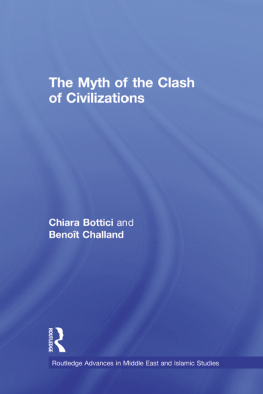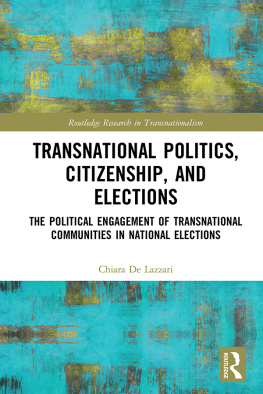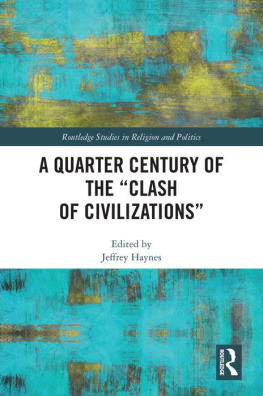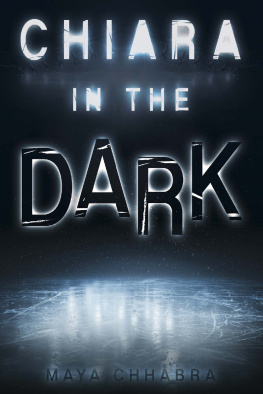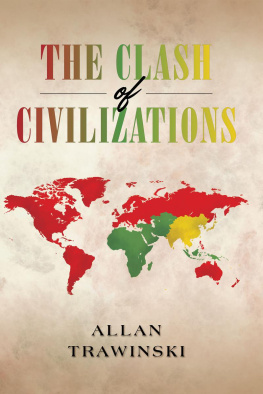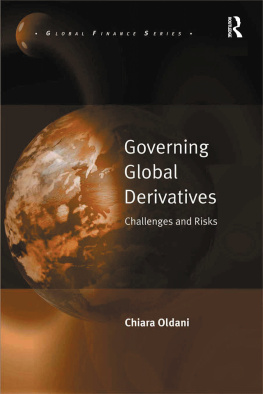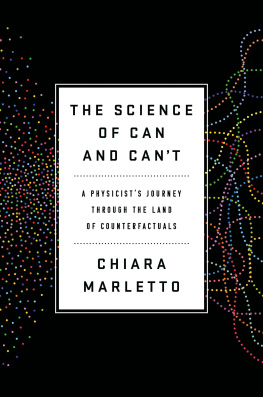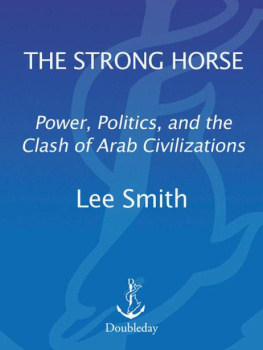The Myth of the
Clash of Civilizations
While globalization unifies the world, divisions re-emerge within it in the form of a spectacular separation between Islam and the West. How can it be that Huntingtons contested idea of a clash of civilizations became such a powerful political myth through which so many people look at the world? This book suggests that the success of Huntingtons book lies in its title more than in its content: Huntington simply provided a name to a political myth that was already in the making.
Bottici and Challand disentangle such a process of myth-making both in the West and in Muslim majority countries, and call for a renewed critical attitude towards it. By analysing a process of elaboration of this myth that took place in academic books, arts and media, comics and Hollywood films, they show that the clash of civilizations has become a cognitive scheme through which people look at the world, a practical image on the basis of which they act on it, as well as a drama which mobilizes passions and emotions. This reflects a deep transformation in the nature of politics itself which is, increasingly, a form of struggle for peoples imagination.
Written in a concise and accessible way, this book is a timely and valuable contribution to the academic literature and, more generally, to the public debate. As such, it will be an important reference for scholars and students of political science, sociology, philosophy, cultural studies, Middle Eastern politics and Islam.
Chiara Bottici is Guest Professor at the University of Frankfurt and Research Fellow at the Italian Institute for the Humanities in Florence.
Benot Challand is Lecturer at the University of Bologna and Research Fellow at the Graduate Institute for International and Development Studies in Geneva.
Routledge Advances in Middle East and Islamic Studies
1 Iraqi Kurdistan
Political development and emergent democracy
Gareth R. V. Stansfield
2 Egypt in the Twenty First Century
Challenges for development
Edited by M. Riad El-Ghonemy
3 The ChristianMuslim Frontier
A zone of contact, conflict or cooperation
Mario Apostolov
4 The Islamic World-System
A study in politymarket interaction
Masudul Alam Choudhury
5 Regional Security in the Middle East
A critical perspective
Pinar Bilgin
6 Political Thought in Islam
A study in intellectual boundaries
Nelly Lahoud
7 Turkeys Kurds
A theoretical analysis of the PKK and Abdullah Ocalan
Ali Kemal zcan
8 Beyond the Arab Disease
New perspectives in politics and culture
Riad Nourallah
9 The Arab Diaspora
Voices of an anguished scream
Zahia Smail Salhi and Ian Richard Netton
10 Gender and Self in Islam
Etin Anwar
11 Nietzsche and Islam
Roy Jackson
12 The Bahais of Iran
Socio-historical studies
Dominic Parvis Brookshaw and Seena B. Fazel
13 Egypts Culture Wars
Politics and practice
Samia Mehrez
14 Islam and Human Rights in Practice
Perspectives across the Ummah
Edited by Shahram Akbarzadeh and Benjamin MacQueen
15 Family in the Middle East
Ideational change in Egypt, Iran and Tunisia
Edited by Kathryn M. Yount and Hoda Rashad
16 Syrias Kurds
History, politics and society
Jordi Tejel
17 Trajectories of Education in the Arab World
Legacies and challenges
Edited by Osama Abi-Mershed
18 The Myth of the Clash of Civilizations
Chiara Bottici and Benot Challand
The Myth of the
Clash of Civilizations
Chiara Bottici and
Benot Challand

First published 2010
by Routledge
2 Park Square, Milton Park, Abingdon, Oxon OX14 4RN
Simultaneously published in the USA and Canada
by Routledge
711 Third Avenue, New York, NY 10017
Routledge is an imprint of the Taylor & Francis Group, an informa business
First issued in paperback 2012
2010 Chiara Bottici and Benot Challand
Typeset in Times New Roman by
Keystroke, Tettenhall, Wolverhampton
All rights reserved. No part of this book may be reprinted or reproduced or utilized in any form or by any electronic, mechanical, or other means, now known or hereafter invented, including photocopying and recording, or in any information storage or retrieval system, without permission in writing from the publishers.
British Library Cataloguing in Publication Data
A catalogue record for this book is available from the British Library
Library of Congress Cataloging in Publication Data
Bottici, Chiara.
The myth of the clash of civilizations / Chiara Bottici and Benot Challand.
p. cm. (Routledge advances in Middle East and Islamic studies ; 18)
Includes bibliographical references and index.
1. Islamic countriesRelationsWestern
countries. 2. Western countriesRelationsIslamic countries. 3. Civilization, Islamic.
4. Civilization, Western. I. Challand, Benot, 1972 II. Title.
DS35.74.W47B68 2010
303.482176701821dc22 | 2009052818 |
ISBN13: 9780415573276 (hbk)
ISBN13: 978-0-415-63280-5 (pbk)
ISBN13: 9780203848845 (ebk)
A celles et ceux qui luttent pour vivre au-del des barrires imaginaires
Contents
Illustrations
Figures
Tables
Acknowledgements
This book is the result of an interdisciplinary research project that started in 2005. Its first result was published in an article entitled Rethinking Political Myth: The Clash of Civilisations as a Self-Fulfilling Prophecy which appeared in 2006 in the European Journal of Social Theory 9(3): 31536. We are grateful to its editor Gerard Delanty, the anonymous referees and the friends and colleagues who read this initial article for their help, suggestions and comments. Positive feedback on this initial writing gave us the impetus to embark on a book project which took four years to complete.
The results of the research have been presented and discussed on many occasions, including presentations at the Summer Academy Islam and the Repositioning of Religion, Kulturwissenchaftliches Institut, Essen, Germany (29 July 2006), the panel on Political Psychology of the European Consortium for Political Research conference in Pisa, Italy (68 September 2007), British International Studies Association annual conference held in Cambridge (UK) on 1719 December 2007 and the Philosophy and Social Sciences Conference held at the Department of Philosophy of the University of Prague on 1317 May 2009. Part of this material was also discussed with Benot Challands students in Bologna and those following the MICAD Masters Programme in Bethlehem. We are very grateful to all those who contributed to the lively discussions held on those occasions with their questions and interventions. The students in Bethlehem, who were doing an applied assignment with a discourse analysis of material about the clash of civilizations in Arabic, came up with great material and stimulating ideas. Students of the fourth and fifth cohorts are warmly thanked here.

